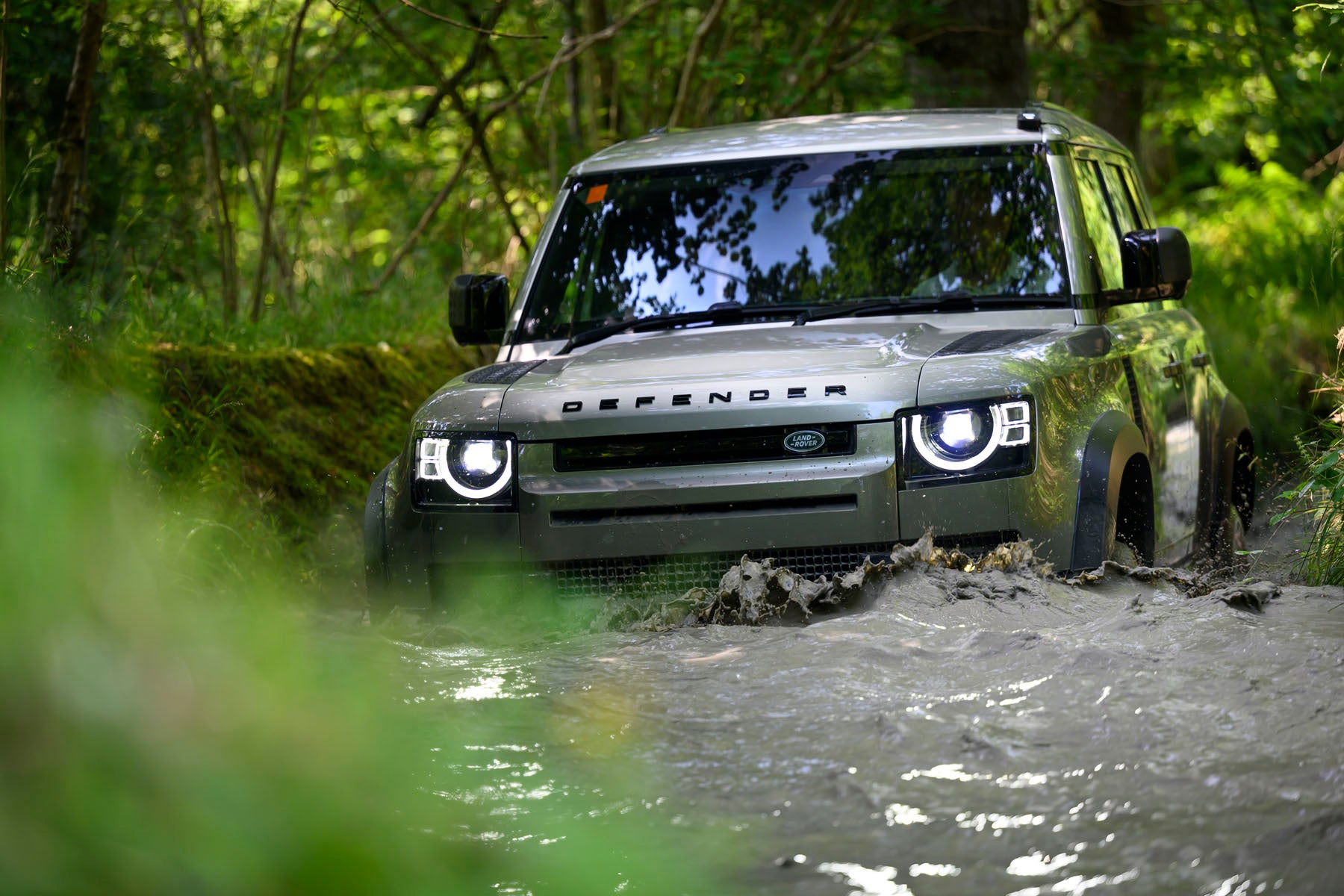Land Rover Defender Review 2024
Written by Andrew Brady
Quick overview
Pros
- Wide range of petrol, diesel and hybrid engines
- Surprisingly capable on road (and off it)
- Spacious and well-thought-through interior
Cons
- Expensive to buy new
- It'll cost a lot to run
- Not everyone will like the image
Overall verdict on the Land Rover Defender
"While the Land Rover Defender has moved upmarket, it remains one of the world's best off-roaders. It's just as capable as the old model at plowing through mud or wading through deep water, yet it's also surprisingly refined and comfortable on the road, too. The new Defender is also such a versatile SUV - available in a wide variety of shapes and bodystyles, with an engine to suit every buyer."
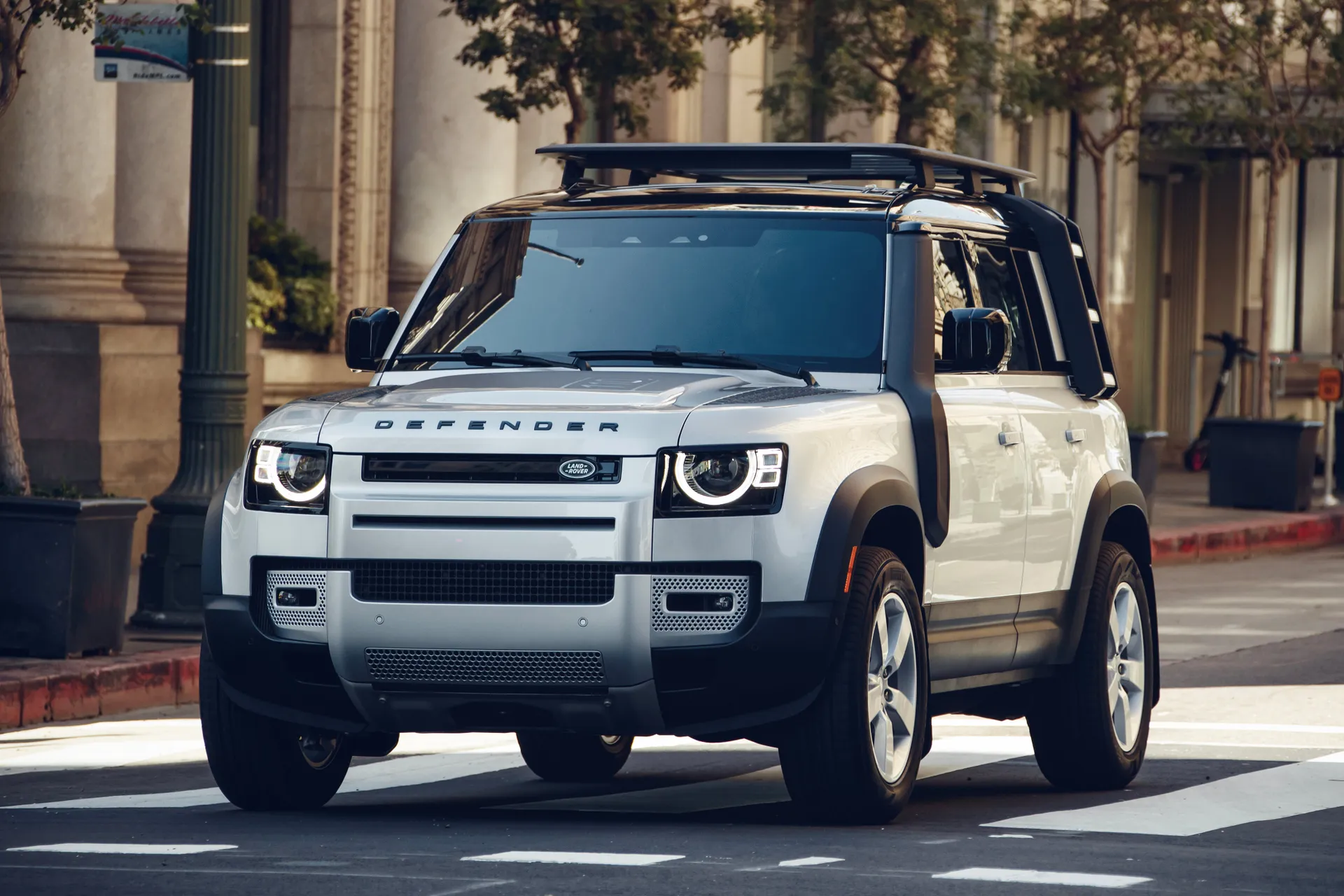
Unmistakably a Defender, the latest Land Rover Defender is a premium take on an off-road vehicle. It's intended to rival SUVs like the Mercedes G-Class and Jeep Wrangler, with a price tag that pitches it alongside premium competitors such as the BMW X5 and Mercedes GLE.
There are three disctint models available, each slightly longer in size: the Defender 90, Defender 110 and Defender 130. With a distinctive silhouette, a boxy outline and a spare wheel on the rear door, the Defender will turn more heads than much fancier SUVs. It’s more modern than before - much more modern than before - with high-spec models getting matrix LED headlights, huge alloy wheels and a panoramic sunroof.
The interior is dominated by a crossbeam running across the width of the car, while an 11.4-inch infotainment screen sits on the centre console. The Land Rover Defender much is more technologically advanced than the old model (which is a bit like saying the BYD Seal is more technologically advanced than a Morris Minor).
Land Rover says its new Pivi Pro infotainment system is more intuitive and user-friendly than previous versions, with instant responses and requiring fewer inputs to perform frequently used tasks. A fancy 12.3-inch interactive driver display is now standard across the range, sitting behind the steering wheel and allowing the driver to switch between navigation and conventional dials or a combination of the two. Meanwhile, over-the-air updates will ensure the latest Land Rover Defender is always kept up-to-date.
Traditionalists may complain that the Land Rover Defender has lost some of its character in the way that it drives, but we think most will appreciate the extra comfort on offer compared to the old model. It feels like a big, chunky SUV (particularly in the case of 110 and 130 models), but there's a whole heap of technology on hand to make life easier for the driver (on road and off road).
Most buyers will go for diesel power in the new Defender which, as of 2024, is a 3.0-litre six-cylinder unit available with 250PS or 350PS. Each represents a marked improvement over the 2.0-litre four-cylinder diesel engine that was initially offered in the Land Rover Defender, while the standard-fit eight-speed automatic gearbox is hard to fault. Other engine choices include an expensive plug-in hybrid or thirsty (but fun) petrols, including a range-topping 525PS 5.0-litre V8 that can shift the Defender 90 to 62mph in just 5.2 seconds.
Looking for a used car for sale? We've got 100s of Land Rover Approved Used Cars for Sale for you to choose from, including a wide range of Land Rover Defenders for sale.
Is the Land Rover Defender right for you?
If you're looking for a premium SUV with genuine off-road credentials, you're not going to beat the Land Rover Defender. Sure, it's an expensive choice, but it feels special and is enormously capable off-road. Not everyone will care about that - but, if you're in the market for a versatile family vehicle, the latest Land Rover Defender is comfortable, modern and extremely practical. Sure, there are cars that can perform all the same tricks for less money - but none have the same cache as that Defender badge.
What other cars are similar to the Land Rover Defender?
The Land Rover Defender's obvious rivals include the Mercedes-Benz G-Class and Jeep Wrangler, while the Ineos Grenadier is intended to retain some of the character of the old Defender. You're also likely to consider the Land Rover Defender alongside premium SUVs, such as the Land Rover Discovery, Audi Q7, BMW X5, Mercedes GLE and Volvo XC90. If you're wanting a characterful 4x4 with genuine off-road credentials, it might be worth waiting for the new Toyota Land Cruiser.
Comfort and design: Land Rover Defender interior
"The new Land Rover Defender manages to combine modern touches with a rugged approach to interior design. Land Rover says that structural elements and fixings usually hidden from view have been exposed, with the emphasis on simplicity and practicality."
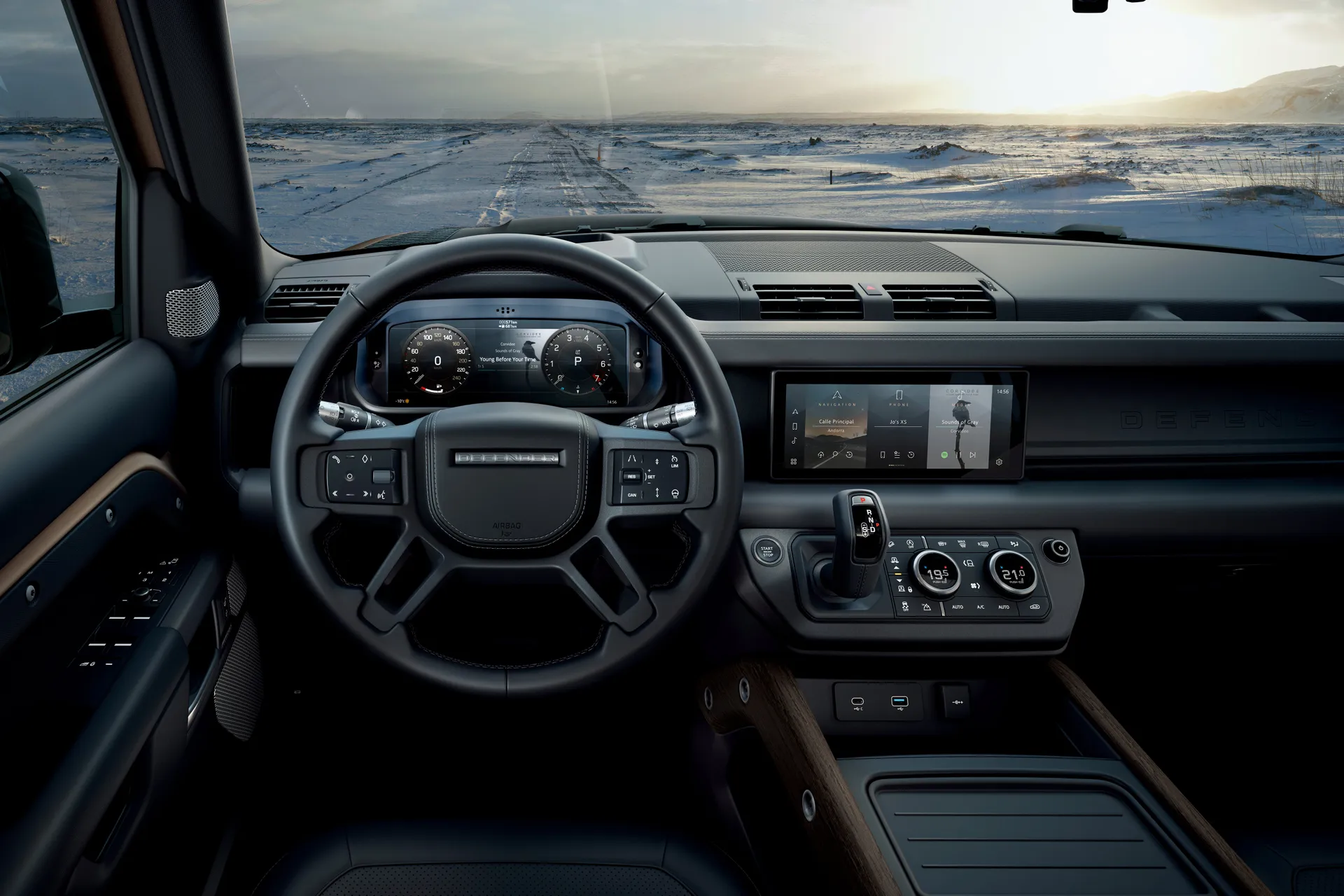
In terms of comfort, the new Land Rover Defender is a country mile away from the old car. It's as accomodating and quiet in here as similar-sized premium SUVs, and the driving position is lofty to give you the commanding view that makes them such a popular choice.
It's also a little more straightforward inside compared to conventional rivals. That's not to say it isn't loaded with technology, but the touchscreen and the major controls are all grouped high up on the dashboard and the centre console is designed to carry stuff rather than housing a lot of buttons. Despite this, the Defender is no longer the kind of car you'd clean out using a hosepipe.
Quality and finish
The Land Rover Defender has certainly been influenced by the other premium Land Rover models, but it hasn't completely abandoned its practical roots in favour of pure luxury.
There’s a clever dash-mounted gear shifter, which allows space for an optional central front ‘jump’ seat which allows three-abreast seating - just like an old Land Rover, and the design of the interior has been executed with tough conditions in mind. Many of the switches are larger than normal so you can operate them while wearing gloves, and there are plenty of surfaces with a rubberised finish.
Infotainment: Touchscreen, USB, nav and stereo in the Land Rover Defender
The Land Rover Defender uses the brand's latest Pivi Pro infotainment screen, which now uses an impressive 11.4-inch display as standard across the range. It's one of the better systems on the market, offering clear rather than overcomplicated graphics and operates in a slick fashion. Meanwhile, over-the-air updates will ensure the latest Land Rover Defender is always kept up-to-date.
Apple CarPlay and Android Auto are included as standard on all models, while the standard audio offering is an excellent Meridian Sound System with 400W, 10 speakers and a subwoofer. An upgraded 700W system with 14 speakers plus woofer is available as an option, and is standard on the Defender 110 V8.
A smart 12.3-inch interactive driver display is also standard across the range, too. This sits behind the steering wheel, allowing the driver to switch between navigation and conventional dials or a combination of the two.
Space and practicality: Land Rover Defender boot space
There are three sizes of Land Rover Defender available: Defender 90, Defender 110 and Defender 130.
The smallest is the Land Rover Defender 90, which is essentially a three-door short-wheelbase model. This measures 4583mm long, 2105mm wide (including door mirrors) and 1969mm tall, so it's not exactly a small SUV. The Land Rover Defender 110 is longer, measuring up to 5018mm in length (including the spare wheel), while the Defender 130 is longer still - with a maximum length of 5358mm. That's longer than a BMW X7, if size is important to you.
Those sizeable exterior proportions translate into excellent interior space, helped by the relatively boxy design. Those in the front have all the head, leg and shoulder room they could reasonably wish for, with an excellent view out to boot. Go for the optional 'jump seat' in the middle of the front row and you can seat six and still have all the boot space, but it's an occasional seat at best.
It's a similar story in the second row, where three adults can sit comfortably without bashing elbows all the time. Go for the Defender 110 with the 5+2 seating option and you have two seats in the third row that fold into the floor. Even those chairs offer good headroom, although legroom isn't as generous as the second row. There are better seven seat options if that's what you're looking for.
Defender 90 buyers will lose out in overall luggage space compared to the bigger models. The short-wheelbase model can carry up to 397 litres of luggage, compared to an impressive 972 litres for the Defender 110. The Defender 130 has a huge 1329 litres of luggage space when used as a five-seater.
Handling and ride quality: What is the Land Rover Defender like to drive?
"The good news is that the new Land Rover Defender is absolutely nothing like the original Defender when it comes to the driving experience."

The latest Land Rover Defender feels more like a big SUV - much like a Discovery - rather than a hardcore off-road vehicle. Even on the road, it's refined and civilised, easily capable of covering long journeys in comfort.
The Land Rover Defender 110 comes with air suspension as standard. This does an impressive job of smoothing over uneven road surfaces. The Defender 90, with its standard coil-sprung suspension, feels a bit bumpier - although it's far from uncomfortable (and air suspension is available as an option).
Unsurprisingly, the Defender's agility much depends on which model you choose. The smallest Defender 90 is the easiest to thread through city streets, while the 110 feels a little more cumbersome. We haven't driven a Land Rover Defender 130, although its serious dimensions mean it probably requires a little more concentration when driving - especially during parking manoeuvres.
One thing all Land Rover Defenders have in common is how sensationally capable they are off road. Terrain Response is standard, allowing you to choose from a variety of drive modes which adapt to the situation (such as mud and ruts or sand). The Defender makes light work out of challenging conditions - unlike the old model, the driver needs very little in the way of skill to traverse obstacles.
One of our favourite off-road features is the Wade Mode. Should you need to drive through deep water, Wade mode can soften the throttle response, adjust the heating to recirculate cabin air and - where air suspension is fitted - raise the Defender's ride height. It also activates the clever Wade Sensing feature, which shows a visual display of the car as well as the water it's driving through. It can warn you when you're getting close to the Defender's maximum wading depth, too, using an audible beep (similar to a parking sensor).
What engines and gearboxes are available in the Land Rover Defender?
There's a broad range of engine options available here, although we reckon most buyers will be best sticking with simple diesel power.
Early Land Rover Defender models were available with a short-lived 2.0-litre diesel engine, which was more than up to the job of moving the heavy SUV, albeit without the refinement (and performance) of the later 3.0-litre diesel engine.
The 3.0-litre six-cylinder diesel is available in 250PS D250 form and also 300PS D300 spec, both matched to an eight-speed automatic gearbox. The Land Rover Defender 110 D250 is perfectly fine and has enough grunt to keep up with traffic and haul all your kit. The D300 option is nice if you can stretch to it, but it's far from essential.
The P425 option is a 5.0-litre V8 petrol that offers up a serious 425PS and 550Nm of torque, enough for it to reach 0-62mph in just 5.6 seconds. It's a fun option but needs to be revved harder than the diesels in everyday driving, and will also deliver borderline terrifying fuel consumption.
The other petrol option is badged the Land Rover Defender V8, which gets you the same 5.0-litre petrol engine but with 525PS and 625Nm of torque. Think of this as an alternative to cars like the Mercedes-AMG G63 and you won't be far off - it's enormous fun with a 0-62mph time of just 5.2 seconds and a top speed of 149mph.
In a nod towards eco motoring, the Land Rover Defender is also available as a plug-in hybrid. Badged the Defender P300e, this is only available on the 110 model. It pairs a 2.0-litre petrol engine with an electric motor to provide a power output of 300PS and a 0-62mph time of 7.6 seconds.
Refinement and noise levels
The difference between the old Land Rover Defender and the new model couldn't be more extreme in terms of refinement. Wind noise is well contained (despite the chunky exterior), and there's little in the way of engine rumbles getting into the cabin regardless of which engine you choose. That's unless you buy a Defender V8, anyway, in which case you probably want to hear the noise of the engine.
Safety equipment: How safe is the Land Rover Defender?
Euro NCAP awarded the Land Rover Defender the full five stars when it was crash tested, which means it's one of the safest family SUVs you can buy.
Even the most basic Land Rover Defender comes with Lane Keep Assist, Autonomous Emergency Braking, Traffic Sign Recognition and Adaptive Speed Limiter, plus nice extras such as a 3D-surround camera, adaptive cruise control and a 360-degree parking aid. Look for a Defender X-Dynamic SE for Blind Spot Assist, Rear Collision Monitor and Rear Traffic Monitor.
MPG and fuel costs: What does the Land Rover Defender cost to run?
"If you buy a Land Rover Defender, you'll need to be prepared for high running costs. There is one model that'll be cheaper to run than others, but you'll have to pay a premium for one of these in the first place..."
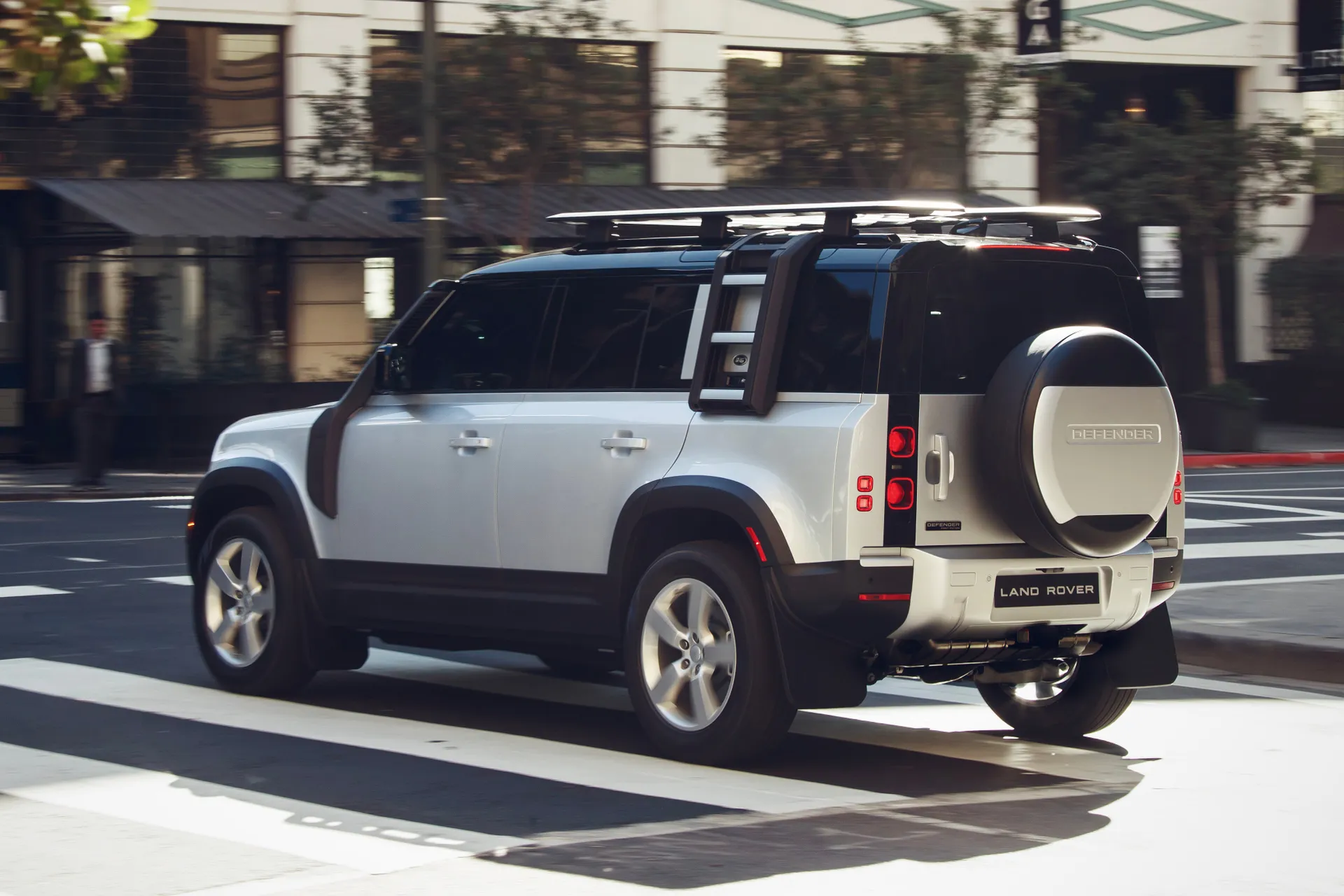
On paper, the most efficient Land Rover Defender is the P300e plug-in hybrid. This can be plugged in at home, providing an electric-only range of around 30 miles. As the official WLTP fuel economy tests are less than 30 miles, the Defender P300e hardly uses a drop of fuel according to official figures - indeed, it returns up to 104.2mpg (depending on trim level). The real-world fuel economy of the PHEV will depend on how often it's charged and the kind of journeys you cover - it'll be significantly less than this if you expect to travel the length and breadth of the country without charging it.
The diesels all return around 32.0 or 33.0mpg depending on the trim level (and size of Defender), while the petrol models will be considerably pricier to run. The V8 models all return less than 20.0mpg in official tests - and you can expect the real-world economy to be even less than this.
How reliable is the Land Rover Defender?
Land Rover doesn't enjoy the best reliability record and regularly performs poorly in ownership surveys including the HonestJohn.co.uk Satisfaction Index. We've heard of fewer issues with the latest Defender than other Land Rover models, but we'd still recommend buying one with a warranty for added peace of mind.
Insurance groups and costs
The Land Rover Defender is likely to be quite an expensive SUV to insure, although some are pricier than others. Generally, the lower-powered models will be the cheapest, sitting in insurance groups 31 to 37.
At the other end of the scale, the Defender P400e plug-in hybrid or powerful V8 models will be the most expensive to insure - sitting in insurance groups 46 to 47.
VED car tax: What is the annual road tax on a Land Rover Defender?
With a price tag of more than £40,000, all Land Rover Defender models are subject to the premium car tax surcharge (on top of the regular VED tax rate). That means you'll pay a hefty £600 a year between the second and sixth year of registration, and then the standard flat rate after that – currently £190 a year. Hybrid models qualify for a £10/year discount.
How much should you be paying for a used Land Rover Defender?
"High demand means Land Rover Defender prices remain strong. A budget of around £40,000 will get you an early example on the used market, though."
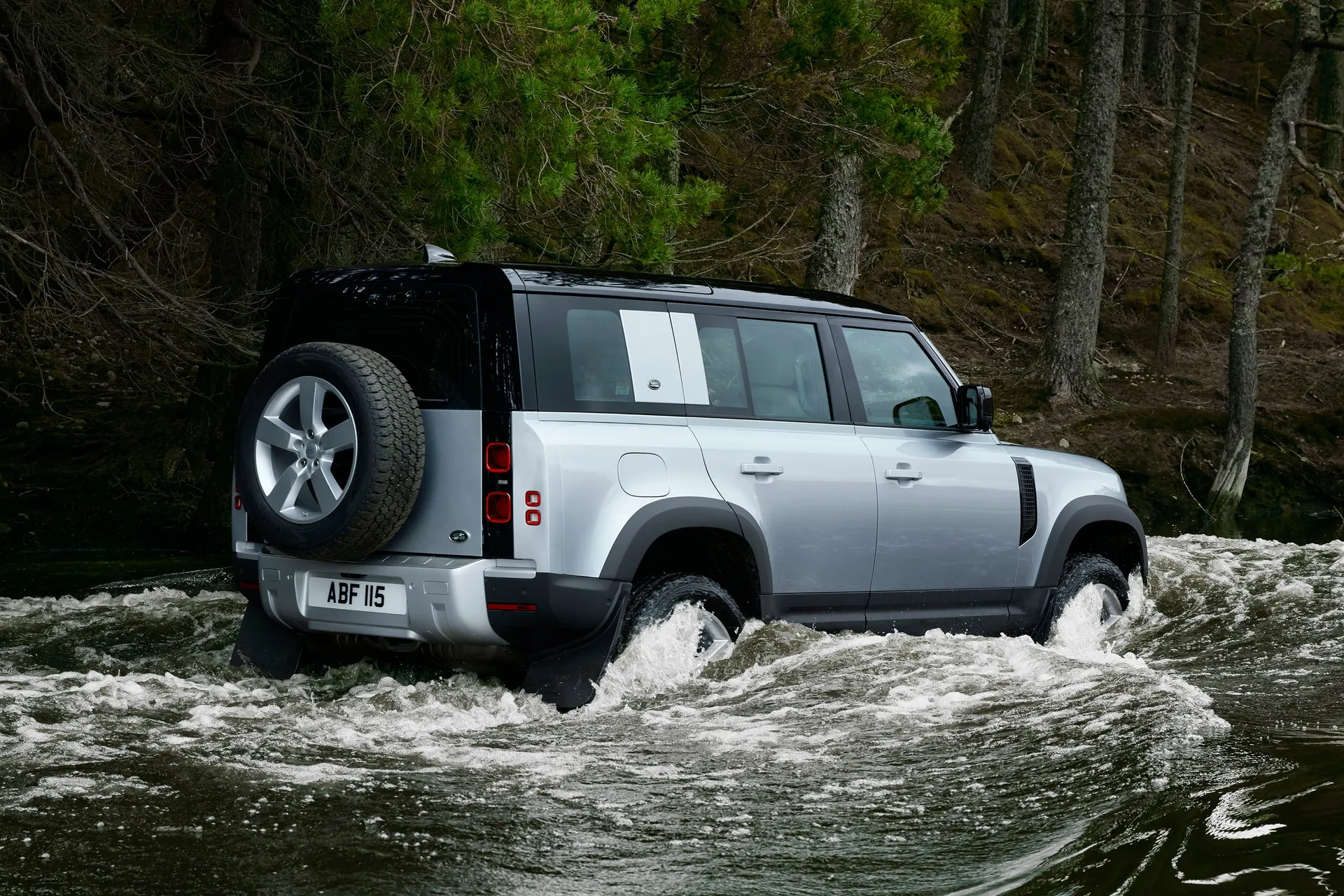
The cheapest Land Rover Defenders you can buy will be powered by the 2.0-litre diesel engine. If you can, we'd recommend stretching to the 3.0-litre diesel - these start from around £45,000.
If you're looking for a new Land Rover Defender, list prices start from around £60,000 for a Defender 90 D250. The most desirable Land Rover Defender models - including the rapid Defender V8 - start from well over £100,000. While the Defender might once have been an affordable farm hack, today its price tag reflects it status as an upmarket SUV.
Trim levels and standard equipment
Standard equipment across the Land Rover Defender range includes all-season tyres, a heated rear window, Isofix child seat mounting points on the outer second-row seats, keyless entry and auto high beam assist. An 11.4-inch Pivi Pro media system is standard (including Android Auto and Apple CarPlay), as well as an interactive driver display and wireless phone charging. Driver-assistance tech highlights include a 3D surround camera, emergency braking, traffic sign recognition and lane keep assist.
The Land Rover Defender S adds 19-inch alloy wheels, privacy glass and a body-coloured roof with black roof rails (on the 110). Inside, the Defender S comes with 12-way heated semi-powered front seats, an Ebony interior, two-tone climate control and a Meridian sound system. Adaptive cruise control is standard, as well Terrain Response and coil-sprung suspension.
The Land Rover Defender X-Dynamic SE adds 20-inch alloy wheels, a panoramic sunroof (on the Defender 110 and 130) and black exterior highlights. Inside, the X-Dynamic SE comes with 12-way heated electric adjustable front seats (on the 110 and 130 - heated, electric driver's seat for the 90), configurable cabin lighting, Isofix mounting points for the front passenger seat (110 and 130), illuminated metal treadplates, blind spot assist, rear collision monitor, rear traffic monitor and electronic air suspension (Defender 130).
The Land Rover Defender X-Dynamic HSE comes with Matrix LED headlights, front fog lights and dark grey 20-inch alloy wheels. Standard equipment inside includes 14-way adjustable heated and cooled driver's seat (and front passenger on the 110/130), Ebony leather seats, a heated leather steering wheel, electrically adjustable steering column, soft close tailgate, Meridian surround sound system and a head-up display.
Land Rover Defender X models come with black and orange exterior highlights, 22-inch gloss black alloy wheels and headlight power washers. Inside, the Defender X features bespoke seats (finished in Ebony Windsor leather and Kvadrat), bright metal pedals, a Clearsight interior mirror, a domestic plug socket, Terrain Response 2, wade sensing and an electronic active differential with torque-vectoring.
The Land Rover Defender V8 comes with a sliding panoramic roof, premium metallic paint, black brake calipers, black rear recovery eyes and an electrically deployable tow bar (Defender 90). Inside, the V8 comes with satin chrome gearshift paddles, a front centre console fridge, heated washer jets and a HomeLink garage door opener. The Land Rover Defender V8 also comes with Terrain Response 2 with Dynamic Program and advanced tow assist.
Ask the heycar experts: common questions
Which is better: the Defender 90, 110 or 130?
Why is the Land Rover Defender so expensive in the UK?
Is the Land Rover Defender good off road?
Land Rover Defender Alternatives
Get our latest advice, news and offers
Keep me updated by email with the latest advice, news and offers from heycar.
By submitting you agree to our privacy policy
